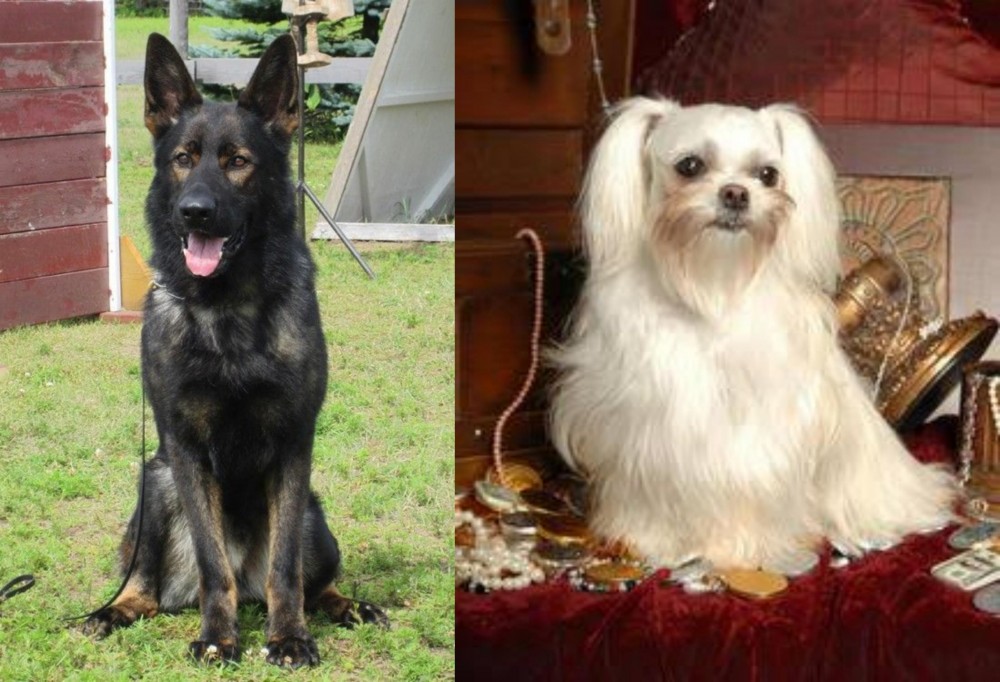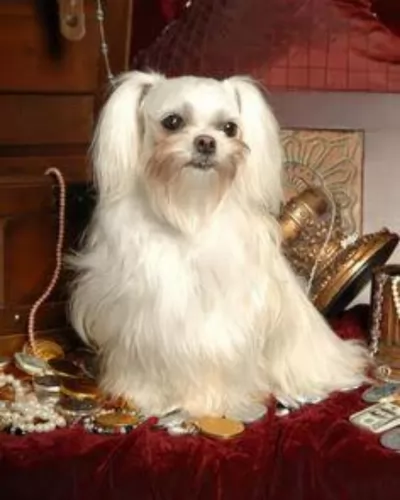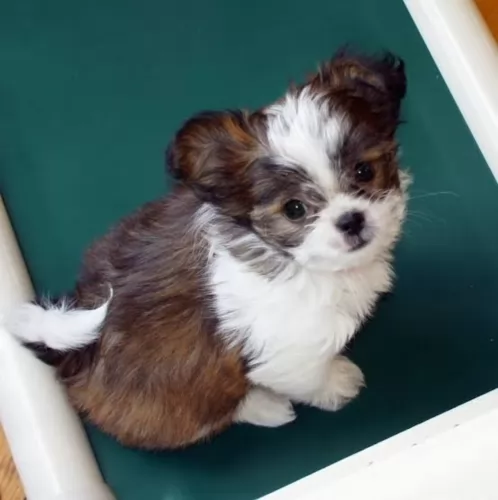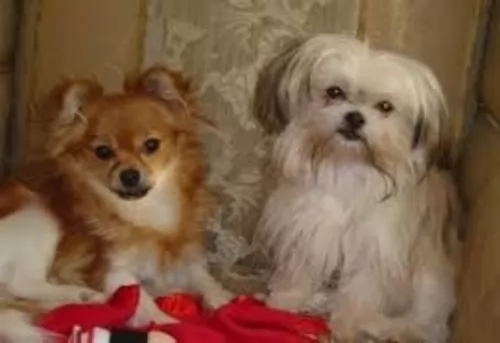 Petzlover
Petzlover East German Shepherd is originated from Germany but Toy Mi-Ki is originated from United States. East German Shepherd may grow 35 cm / 14 inches higher than Toy Mi-Ki. East German Shepherd may weigh 35 kg / 78 pounds more than Toy Mi-Ki. Both East German Shepherd and Toy Mi-Ki has almost same life span. East German Shepherd may have more litter size than Toy Mi-Ki. East German Shepherd requires High Maintenance. But Toy Mi-Ki requires Moderate Maintenance
East German Shepherd is originated from Germany but Toy Mi-Ki is originated from United States. East German Shepherd may grow 35 cm / 14 inches higher than Toy Mi-Ki. East German Shepherd may weigh 35 kg / 78 pounds more than Toy Mi-Ki. Both East German Shepherd and Toy Mi-Ki has almost same life span. East German Shepherd may have more litter size than Toy Mi-Ki. East German Shepherd requires High Maintenance. But Toy Mi-Ki requires Moderate Maintenance
 The East German Shepherd is a line of the German Shepherd Dog breed. The German Shepherd Dog came about when the three types of “continental shepherd dogs” separated into the Dutch Shephers, German Shepherd and Belgian Shepherd. In the 1800’s it was local shepherds who bred their dogs and selected the traits they needed in their geography. The result was dogs in various local areas who all could herd and guard flocks; who were intelligent, strong, fast and had a good sense of smell, but their appearance and skills varied from town to town.
The changes in Germany from agriculture and sheep to industrial cities rendered the German Sheep Dog obsolete. But was it really? Many felt the dog could be a good working dog in the cities as well but needed some refinement in the breed according to Max von Stephanite. At a dog show in 1899, he found what he wanted – the perfect working dog.Stephanitz bought the dog and founded the Society for the German Shepherd. (Verein fur Deutsch Schaferhunde) Stephanitz is considered the developer of the German Shepherd Dog.
The East German Shepherd is a line of the German Shepherd Dog breed. The German Shepherd Dog came about when the three types of “continental shepherd dogs” separated into the Dutch Shephers, German Shepherd and Belgian Shepherd. In the 1800’s it was local shepherds who bred their dogs and selected the traits they needed in their geography. The result was dogs in various local areas who all could herd and guard flocks; who were intelligent, strong, fast and had a good sense of smell, but their appearance and skills varied from town to town.
The changes in Germany from agriculture and sheep to industrial cities rendered the German Sheep Dog obsolete. But was it really? Many felt the dog could be a good working dog in the cities as well but needed some refinement in the breed according to Max von Stephanite. At a dog show in 1899, he found what he wanted – the perfect working dog.Stephanitz bought the dog and founded the Society for the German Shepherd. (Verein fur Deutsch Schaferhunde) Stephanitz is considered the developer of the German Shepherd Dog.
The East German Shepherd is a line of the same breed. There are several different lines of the German Shepherd Dog, with slight difference for the reason they were bred. For instance, the German Shepherd Dog is bred for looks while the East German Shepherd is bred to be a working dog. Often called a DDR German Shepherd, they came about from the Deutsche Democratic Republic or the Republic of East Germany. For about 40 years in East Germany these dogs were bred only within the DDR bloodline.
The East German Shepherd is stronger, heavier boned, leaner, more muscular and solid. During the time of the Berlin Wall, from 1961-1989, there were few German Shepherds for breeding stock on either side of the wall, but especially in the East. There the government controlled the development of the breed. They developed a separate registry for the DDR – East German Shepherd. With such strict standards for a perfect working dog and such little breeding stock, the only dogs allowed to reproduce were the ones that passed a rigorous test and were deemed perfect working dogs.
In West Germany they continued to breed for appearance. The West German Shepherd are the most popular ones and are usually simply called German Shepherds. The show dogs of today and the American line came from the West.
Preserving the East German Shepherd today is important and difficult. It means preserving not improving. The Strength of the East German Shepherd is their body line and style, Today’s breeder must maintain this while making sure there is enough diversity in the gene pool to keep the line healthy without losing its body style and working temperament. It is important that the East German Shepherd have a straight back rather than the sloping one of the German Shepherd Dog or the American lines of the GSD. The working dog is also more aggressive and has a much higher work drive than any of the other German Shepherd Dogs lines.
 The Toy Mi-Ki is a sociable companion dog. He hasn’t got a long history, and the little bit of history there is, isn’t clear.
The Toy Mi-Ki is a sociable companion dog. He hasn’t got a long history, and the little bit of history there is, isn’t clear.
It is believed that the breed was bought about by Maureen Westburg. It was in the 1980s that she crossed several toy breeds to develop the Mi-Ki. It is thought that she gave the dog the name Mi-Ki because her name was Mikkie. It seems whe wanted a dog that came close to looking like a gremlin.
Some of the dogs used in the breeding program were the Japanese Chin, the Maltese, and the Papillon. The International Miki Registry is trying to get recognition with the United Kennel Club for this dog. There are other canine clubs and organizations that recognize the Mi-Ki Dog as a breed.
 What are the differences between the German Shepherd Dog (GSD) and the East German Shepherd? The East German Shepherd has a straight back and a larger bone structure. He has a very large and block shaped head with a lean, athletic build. His lips are taunt and dark, and his nose must be black. He has a scissor bite and strong teeth. His eyes are medium sized almonds that are slanted slightly. The eyes are also very dark. His ears are erect and not too big. His legs, haunches and feet must all be coordinated so that he trots rather than runs.
What are the differences between the German Shepherd Dog (GSD) and the East German Shepherd? The East German Shepherd has a straight back and a larger bone structure. He has a very large and block shaped head with a lean, athletic build. His lips are taunt and dark, and his nose must be black. He has a scissor bite and strong teeth. His eyes are medium sized almonds that are slanted slightly. The eyes are also very dark. His ears are erect and not too big. His legs, haunches and feet must all be coordinated so that he trots rather than runs.
 The small Toy Miki stands at between 25 cm – 30 cm in height and weighs between 2 – 5kg. You get two different coat types – long and short and the long-haired variety also has quite a bit of hair around the face.
The small Toy Miki stands at between 25 cm – 30 cm in height and weighs between 2 – 5kg. You get two different coat types – long and short and the long-haired variety also has quite a bit of hair around the face.
His longish coat is low-shedding which makes him popular for people who battle with allergies. The Miki Dog will produce about 2 – 4 puppies.
As a toy dog, he has a domed head with large eyes. Their ears are feathered and are carried erect and the tail is long and feathered.
These little dogs are popular companion dogs and they’re intelligent and loving, making the ideal pet for anyone.
It’s a friendly dog and yet he will bark to alert you of an intruder. Youll take notice because he isn’t the kind of dog that just yaps away.
Children love them and they make great playmates for children who have been taught to be kind and gentle with animals.
Their small size and their adaptable nature make them suitable for city or country living. Sweet and amicable, the social purebred Toy Mi-Ki is everything you want in a companion.
He is loyal and devoted, calm and adaptable. They’re not the kind of dogs to go jogging with you, but nonetheless, he will still need his exercise – walks every day as well as ball games.
 The East German Shepherd is a well- balanced dog. He is sure of himself, friendly, loyal and wants to please his owner. He is intelligent, resilient and attentive. He will make a great family pet. He is aggressive with a high prey drive but that can be tempered with good socialization and training. He is easy to train.
The East German Shepherd is a well- balanced dog. He is sure of himself, friendly, loyal and wants to please his owner. He is intelligent, resilient and attentive. He will make a great family pet. He is aggressive with a high prey drive but that can be tempered with good socialization and training. He is easy to train.
 The Mi-Ki is calm and good-natured, and because of his cuteness, he can’t help but become a lap dog, if you allow him.
The Mi-Ki is calm and good-natured, and because of his cuteness, he can’t help but become a lap dog, if you allow him.
He is social and just loves human companionship. He is friendly too and will quite happily be friends with children and pets in the home.
Make sure he is trained and socialized so that you become one of the many people who have nothing but good things to say about this sweet little dog.
 Because the East German Shepherd line has been isolated behind the Berlin Wall, there are not many genetic health issues in the line. Most importantly the East German Shepherd shows no hip dysplasia which plagues most GSD. There are a couple of situations to look out for. They are:
Because the East German Shepherd line has been isolated behind the Berlin Wall, there are not many genetic health issues in the line. Most importantly the East German Shepherd shows no hip dysplasia which plagues most GSD. There are a couple of situations to look out for. They are:
A life threatening issue that must be addressed immediately for fear of death. Bloat is caused when a larger dog with a deep chest eats too large a meal before or after strenuous exercise, eats too fast, or drinks too much water. The stomach distends with air or gas and twists. Sometimes it is completely inverted. Get help fast or your dog will die.
 You just have to bear in mind, that because of his short muzzle, he is prone to respiratory problems. Too much exercise and you may find him huffing and puffing. Be careful on a hot day.
You just have to bear in mind, that because of his short muzzle, he is prone to respiratory problems. Too much exercise and you may find him huffing and puffing. Be careful on a hot day.
Also, little dogs like this often have all kinds of dental problems. When you brush him, check his teeth because he can’t tell you if he has a rotten tooth causing him a lot of pain and misery.
Check his eyes too that they are bright and clear and check the inside of his ears. Hypothyroidism and eye issues can also bother the Mi-ki.
 Because these dogs were bred to work you need to feed them a high quality dry food, made for working dogs. It needs to have a good amount of calcium and glucosamine. Feed about 3-4 cups per day divided into 2 feeding times.
Because these dogs were bred to work you need to feed them a high quality dry food, made for working dogs. It needs to have a good amount of calcium and glucosamine. Feed about 3-4 cups per day divided into 2 feeding times.
In addition to bloat as mentioned above, the East German Shepherd can also have both air born, and food born allergies. These are easily treated by your veterinarian.
The East German Shepherd is a high energy, high activity dog so you have some for him. He is agile and athletic. He needs serious exercise and a job is essential. If you can’t give an East German Shepherd a job, then don’t get this dog. He loves tracking and has a high prey drive. Keep him trained, challenged and working. Try tracking and herding trials, obedience, agility, fly ball and bar hunt.
 Considered to be low-shedding, the Mi-Ki will benefit from a brush once or twice a week.
Considered to be low-shedding, the Mi-Ki will benefit from a brush once or twice a week.
Some people take their Mi-Ki’s to have their hair professionally cut. This is a good move because then the ears, teeth, and nails are attended to as well.
You can do all of these things at home yourself, but sometimes, particularly with the long-haired Miki, the matting of the hair can make it that you rather send him to professional groomers.
Like all dogs, the Mi-Ki dog will need nutritious food if he is to stay healthy. He isn’t a big eater and you will find the perfect food for your small canine pet.
Read on the packaging to make sure you get high-quality dry food for small dogs. You want the ingredients to be as natural as possible without any toxic colorants and additives.
Meat and protein must always be the top ingredients. Try to provide some home-made food too. Boiled chicken, brown rice, spinach, and sweet potatoes can be chopped up finely and a small portion added occasionally to the dry kibble as a tasty treat.